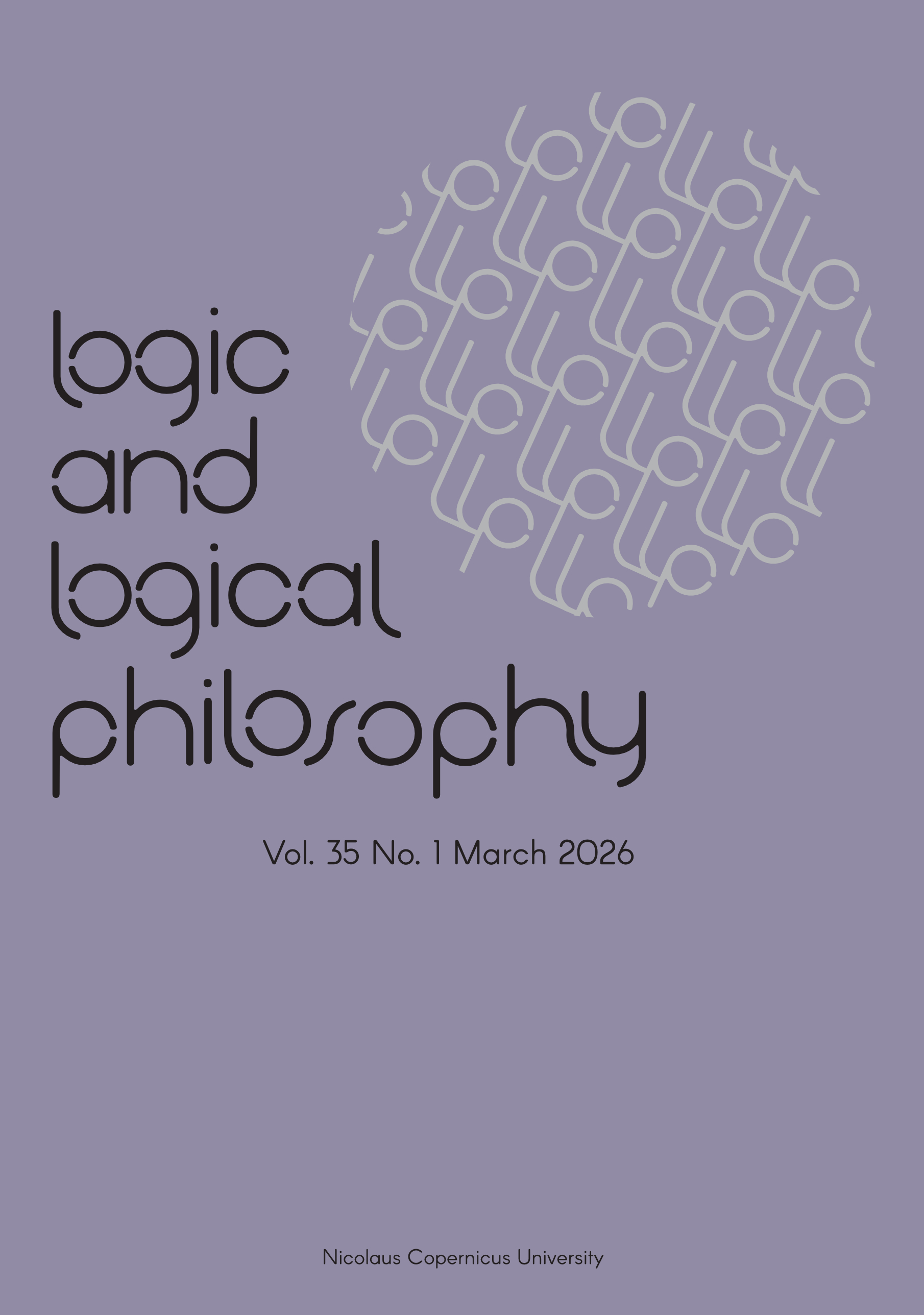Particular Reasoning Within Theories
DOI:
https://doi.org/10.12775/LLP.2025.008Keywords
theories,, particular reasoning, labelled deduction, knowledge representationAbstract
Particular reasoning enables the deductive proof of existential properties, such as the satisfiability/consistency of a set of formulas. In this work, we consider particular reasoning in the context of a theory of a given logic. The logic is presented by a semantic constraint specification. From this specification, we induce a particular calculus for the logic at hand. In this calculus we define what is a particular derivation in the context of a theory and show how to extract a model of the theory that satisfies the assertions within the derivation. We demonstrate that the induced particular calculus is both sound and complete with regard to the intended semantics. Our results are applicable to logics with a strong finite model property, including classical, intuitionistic, certain modal logics, and Nelson’s N4 logic, among others.
References
Amgoud, L., and C. Cayrol, “A reasoning model based on the production of acceptable arguments”, Annals of Mathematics and Artificial Intelligence, 34(1–3), 2002: 197–215. DOI: https://doi.org/10.1023/A:1014490210693
Arieli, O., “Paraconsistent declarative semantics for extended logic programs”, Annals of Mathematics and Artificial Intelligence, 36(4), 2002: 381–417. DOI: https://doi.org/10.1023/A:1016358201013
Bezhanishvili, N., and D. H. J. de Jongh, Intuitionistic Logic, Lecture notes, ESSLLI, Edinburgh, 2005.
Bienvenu, M., M. Leclére, M.-L. Mugnier and M.-C. Rousset, “Reasoning with ontologies”, pages 185–215 in P. Marquis, O. Papini and H. Prade (eds.), A Guided Tour of Artificial Intelligence Research. Volume I: Knowledge Representation, Reasoning and Learning, Springer, 2020. DOI: https://doi.org/10.1007/978-3-030-06164-7_6
Blackburn, P., M. de Rijke and Y. Venema, Modal Logic, Cambridge University Press, 2001. DOI: https://doi.org/10.1017/CBO9781107050884
Bova, S., R. Ganian and S. Szeider, “Model checking existential logic on partially ordered sets”, ACM Transactions on Computational Logic, 17(2), 2015: 1–35. DOI: https://doi.org/10.1145/2603088.2603110
Carnielli, W., and M. Coniglio, Paraconsistent Logic: Consistency, Contradiction and Negation, Springer, 2016. DOI: https://doi.org/10.1007/978-3-319-33205-5
Corea, C., I. Kuhlmann, M. Thimm and J. Grant, “Paraconsistent reasoning for inconsistency measurement in declarative process specifications”, Information Systems, 122, 2024: 102347. DOI: https://doi.org/10.1016/j.is.2024.102347
D’Agostino, M., D. M. Gabbay, R. Hähnle and J. Posegga (eds.), Handbook of Tableau Methods, Kluwer, 1999. DOI: https://doi.org/10.1007/978-94-017-1754-0
Ferrari, M., C. Fiorentini and G. Fiorino, “Contraction-free linear depth sequent calculi for intuitionistic propositional logic with the subformula property and minimal depth counter-models”, Journal of Automated Reasoning, 51(2), 2013: 129–149. DOI: https://doi.org/10.1007/s10817-012-9252-7
Gentzen, G., The Collected Papers of Gerhard Gentzen, Studies in Logic and the Foundations of Mathematics, North-Holland, 1969.
Halpern, J. Y., and R. Pucella, “Modeling adversaries in a logic for security protocol analysis”, pages 115–132 in A. E. Abdallah, P. Ryan, and S. Schneider (eds.), Formal Aspects of Security, Springer, 2003. DOI: https://doi.org/10.1007/978-3-540-40981-6_11
Indrzejczak, A., “Jaśkowski and Gentzen approaches to natural deduction and related systems”, pages 253–264 in K. Kijania-Placek and J. Woleński (eds.), The Lvov-Warsaw School and Contemporary Philosophy, Springer, 1998. DOI: https://doi.org/10.1007/978-94-011-5108-5_21
Jaśkowski, S, “On rules of supposition in formal logic”, Studia Logica, 1, 1934: 5–32. Reprint: pages 232–258 in S. McCall (ed.), Polish Logic 1920–1939, Oxford: Oxford University Press, 1967.
Kamide, N., and H. Wansing, “Proof theory of Nelson’s paraconsistent logic: A uniform perspective”, Theoretical Computer Science, 415, 2012: 1–38. DOI: https://doi.org/10.1016/j.tcs.2011.11.001
Kamide, N., and H. Wansing (eds.), Proof Theory of N4-related Paraconsistent Logics, vol. 54 of Studies in Logic, College Publications, 2015.
Kotas, J., and A. Pieczkowski, “Scientific works of Stanisław Jaśkowski”, Studia Logica, 21, 1967: 7–15. DOI: https://doi.org/10.1007/BF02123411
Lu, K., S. Zhang, P. Stone and X. Chen, “Learning and reasoning for robot dialog and navigation tasks”, pages 107–117 in O. Pietquin, S. Muresan, V. Chen, C. Kennington, D. Vandyke, N. Dethlefs, K. Inoue, E. Ekstedt, and S. Ultes (eds.), Proceedings of the 21th Annual Meeting of the Special Interest Group on Discourse and Dialogue, Association for Computational Linguistics, 2020. DOI: https://doi.org/10.18653/v1/2020.sigdial-1.14
Łukasiewicz, J., Aristotle’s Syllogistic from the Standpoint of Modern Formal Logic, Oxford University Press, 1951.
Negri, S., “Proof analysis in modal logic”, Journal of Philosophical Logic, 34(5-6), 2005: 507–544. DOI: https://doi.org/10.1007/s10992-005-2267-3
Negri, S., “On the duality of proofs and countermodels in labelled sequent calculi”, pages 5–9 in Tableaux, vol. 8123 of Lecture Notes in Computer Science, Springer, 2013. DOI: 1 https://doi.org/0.1007/978-3-642-40537-2_2
Negri, S., “Proofs and countermodels in non-classical logics”, Logica Universalis, 8(1), 2014: 25–60. DOI: https://doi.org/10.1007/s11787-014-0097-1
Nelson, D., “Constructible falsity”, The Journal of Symbolic Logic, 14, 1949: 16–26. DOI: https://doi.org/10.2307/2268973
Ramos, J., J. Rasga and C. Sernadas, “Labelled proof systems for existential reasoning”, Logic Journal of the IGPL, 33(1), 2025: 173–201. DOI: https://doi.org/10.1093/jigpal/jzad030
Rybakov, V. V., Admissibility of Logical Inference Rules, North-Holland, 1997.
Skura, T., “A refutation theory”, Logica Universalis, 3(2), 2009: 293–302. DOI: https://doi.org/10.1007/s11787-009-0009-y
Downloads
Published
How to Cite
Issue
Section
License
Copyright (c) 2025 João Rasga, Cristina Sernadas

This work is licensed under a Creative Commons Attribution-NoDerivatives 4.0 International License.
Stats
Number of views and downloads: 927
Number of citations: 0







